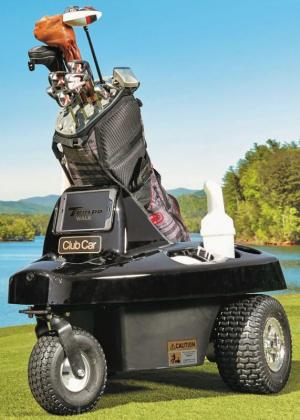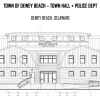Under normal circumstances, the PGA Show’s Demo Day at Orange County National Golf Center would be packed with exhibitors, club pros and media types.
Not this year.
Major club makers were no-shows, and it showed.
By my estimate, the exhibitor count at the huge range was about 15 percent of normal. The crowd was half its former size at best.
For the companies that showed up, however, most seemed to believe the lack of competition for attention presented an opportunity. Their reps were in good spirits, perhaps none more so than David Hules, golf portfolio leader for Club Car, the cart company headquartered in Evans, Ga.
The fact that the MBA grad/mechanical engineer was showing off a cool bit of technology was probably another reason.
According to the Club Car website, the Tempo Walk is “a hands-free, autonomous caddie that offers GPS yardage, [and] carries bags, coolers and other accessories.” The 2022 show featured the third generation of the device, first introduced in 2018.
Hules showed me the small controller unit, about the size of a closed flip-phone, that slides onto your belt in the small of your back. As you walk, the single-person mini-cart follows along, adjusting as needed for hills, slopes or other potential challenges. Using a bit of fencing near the Club Car gazebo, he demonstrated how sensors in the vehicle detect a post or other impediment and stop the cart in time to avoid a collision.
The touchscreen GPS unit on the front of the machine is tablet-sized, facing the golfer as he or she turns around to retrieve a club from the angled bag storage. The bag space accommodates all sizes except perhaps the one Rodney Dangerfield used in “Caddyshack,” as Hules noted with a grin.
Hules said the Tempo Walk presents club owners and operators with an alternative to hand-operated push carts or the normal two-player seated carts. “It’s an amenity they can offer, and helps differentiate their course from others,” he said.
The device’s radio frequency technology limits how many can be in each other’s presence. However, Hules said there could be up to 20 mini-carts on the course at a time.
Four of these aluminum-framed, 95-pound units fit in the space of a single golf cart in a cart barn. Hules said the lithium battery units can handle 36 holes per charge.
The units’ side walls provide dedicated and deep spaces for sand bottles, drinks and other storage, in addition to a small cooler. The USB port is handy for golfers wanting to use a JBL Flip4 or other remote speaker system for their tunes.
Hules said Club Car sold over 2,000 units to more than 300 U.S. golf courses, as well as others in Latin America and Australia. At $4,500 a pop, Tempo Walks sell at a lower price point than regular carts. He said many courses rent them for 80 percent to 100 percent of the normal cart rental charge.
These mini carts fill a potential market niche for golfers who prefer to walk but also appreciate the conveniences of a standard golf cart. It’s also undeniably true that there’s something R2D2 about them that makes you grin to see them in operation.
Graphite Design golf shafts
Custom golf shaft fitting is an often-taken choice of avid golfers seeking to tailor their equipment to their abilities, instead of relying upon the stock offerings provided by club companies.
Graphite Design is a Japanese company, and a leading maker and seller of high-end graphite shafts. While much of its production is shipped to the major original equipment manufacturers, for which upcharges are common, an increasing percentage of its designs are sold through club-fitting companies such as Club Champion, Golf Tec and Second Swing.
At Demo Day for this year’s PGA Show, I met Bill McPherson, vice president of sales and marketing for Pro’s Choice Golf Shafts in southern California. It is the exclusive distributor for Graphite Design in the United States. McPherson noted that if a golfer ordered a driver from Callaway and wanted a Tour AD shaft as part of the purchase, there is a $250 upcharge. A direct purchase from a club fitter for the Tour AD UB model can cost up to $500.
In other words, these shafts are not for the lighthearted or the light of wallet.
McPherson said the Tour AD DI6 has been Graphite Design’s best-selling model for many years. Its shaft stiffness, which is predominantly how shafts affect ball flight, is of medium firmness in the butt and mid-sections but stiff at the tip, promoting a high ball launch.
Other designs are built to create low- or mid-launch characteristics. Each of the company’s models comes in a variety of weight and flex options for more fine-tuning.
To tap a different market segment, the company also offers its MAD shafts at $175 or $275, depending on the specific model chosen. McPherson said the company is going for the competition’s price point. The MAD shafts are built in China, while the rest of the Graphite Design shafts are built in Japan.





















































